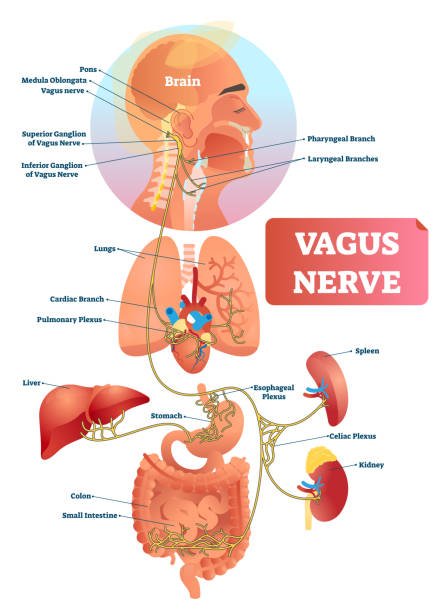The Vagus Nerve Impacts Your Gut & Hormone Health

The longest nerve in your body!
The vagus nerve in latin means wanderer - which is so perfect since this nerve goes from the brain all the way to the gut. This bidirectional communication is often referred to as the brain-gut axis. The nerve impacts mental wellness, intestinal health, and yes, I can even connect it back to hormone health. Your HPA axis part of the brain-gut axis as there’s a feedback loop from the brain to the adrenal glands, they’re talking to each other and communicating any perceived stress.
You’ve probably heard of ‘rest and digest,’ well, that’s the parasympathetic nervous system. Think p for peace. The sympathetic nervous system is responsible for ‘fight or flight.’ I remember this because s is for stress. The vagus nerve is part of the parasympathetic and therefore plays a really big role in breath, heart rate, blood pressure, immunity and stimulating digestion. More vagal tone, aka stronger better working vagus nerve, the more you’re in the parasympathetic.
Think about it this way, if you’re running away from a bear (westcoast living) is your body going to prioritize digestion? Heck no, it’s going to focus on sending blood to the extremities to run away, it will dilate your pupils, speed up your heart rate - all so you are better equipped to fight or take flight. Remember, the brain doesn’t know if the stress is life or death, so it doesn’t know if you’re freaking out over being stuck in rush hour or if you’ve encountered a bear.
A huge percentage of my clients have anxiety or feel anxious often, are depressed, have IBS (we discover why when they work 1:1 with me) or a gastrointestinal disorder. All of these symptoms will improve by supporting your vagus nerve. Working on your vagal tone also supports those with PTSD. We all have stress, but what’s super fascinating is if you have higher vagal tone you will relax faster after a stressful event.
We also pass our vagal tone on to our babies, so wild. An expert explains, “Mothers who are depressed, anxious and angry during their pregnancy have lower vagal activity. And once they give birth to their child, the newborn also has low vagal activity, low dopamine and serotonin levels “.
If you want children, work on your vagal tone now!
Ok, but how?
singing
gargling
cold exposure: ice baths, lake dips
deep slow breathing
humming
chanting
meditation
yoga
potentially probiotics (gut bacteria can improve brain function by affecting the vagus nerve)
omega 3 rich foods (ALA: chia, flax, hemp or DHA/EPA: algae supplement)
exercise
massage
socializing and laughing
If you want to really nerd out and dive into the science of the vagus nerve, read this.
Which of these are you already implementing? Which will you start doing to support your nervous system?
If you’re struggling with IBS, any gastrointestinal upset, poor digestive function or hormone imbalance, I’m here to support you. We will test your stool using the GI-MAP test and determine if you have any bad bacteria, low beneficial flora, parasites, H-pylori, candida, check your SIgA (line of defence for your intestinal tract), gluten sensitivity and so more more.

Your guide to everything you need to know about protein. How much protein you need, meals ideas, plant-protein foods and perimenopause.
As a gut health nutritionist, I give you practical tips, plant-based foods high in iron and a recipe. I also explore reasons why your ferritin may be low.
There are so many different types of magnesium, it’s overwhelming. Thanks to my work experience student, we have complied a chart and a description of each type so you can make an informed decision. Curious to learn your magnesium levels, book in for a hair mineral analysis test.
A week of gut health tips to get your microbiome thriving! Easy to incorporate with a focus on diversity and plants by Jordan Bruce, a holistic nutritionist.
There is so much misinformation about soy consumption. Read why this nutritionist, Jordan Bruce, recommend you eat soy food.
Great for period pain, inflammation, liver detoxification, gut health protocols and hormone balance
Everything you need to know about flax! Why you should include it in your diet and how to prepare
Want to include more plant protein for health reasons? Not sure where to start? Here’s 9 of my favourite plant protein sources and my thoughts on each one!
Paleo? Keto? Let’s stop these short term diets and move towards something more sustainable. My top 6 gut health tips to ease into 2024
Everything you need to know about the bacteria H. pylori and how to support it naturally
Let’s dive into how you can improve constipation, I’ve got a tip for you! Cover image thanks to the book, Gut.
Your nervous system impacts your IBS, digestion, hormones and mood! Read up about the vagus nerve with actionable tips you can take today.
1/10 are diagnosed with endometriosis and it often takes a decade to get a diagnosis. Learn the symptoms here in this blog post!
Read this list to ensure you’re supporting your hormones! Food is powerful and can impact our sex hormones.




























